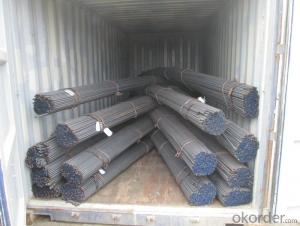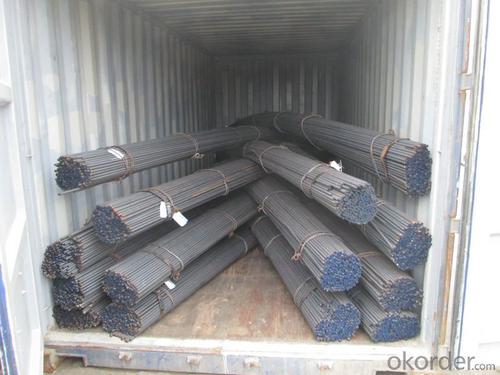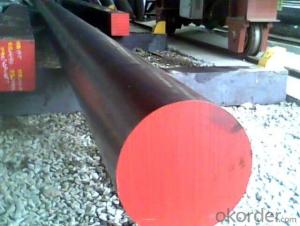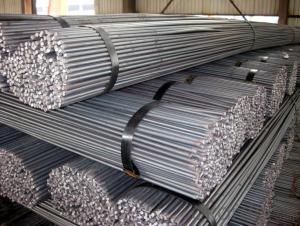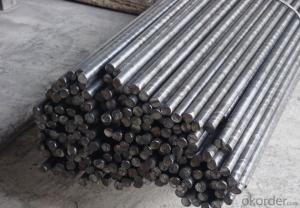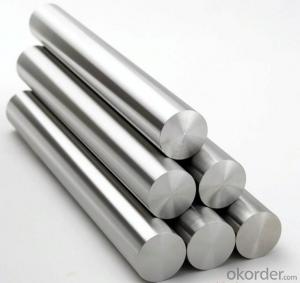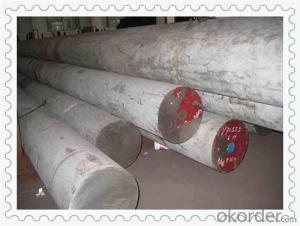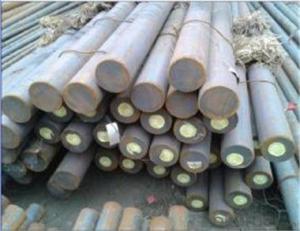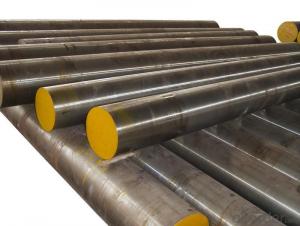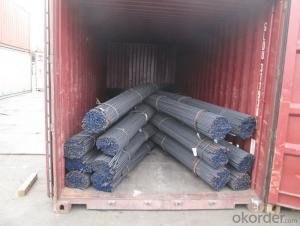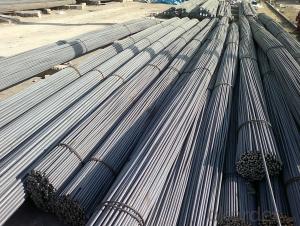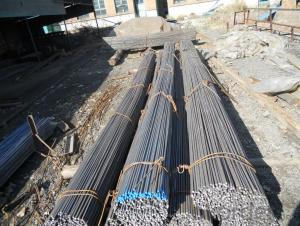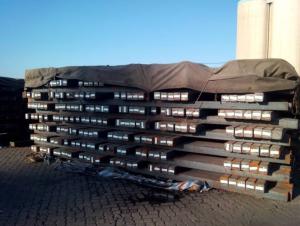Steel Round Bar with Grade Q195/Q235 and High Quality
- Loading Port:
- China main port
- Payment Terms:
- TT OR LC
- Min Order Qty:
- 100 m.t.
- Supply Capability:
- 2000 m.t./month
OKorder Service Pledge
OKorder Financial Service
You Might Also Like
Specification
Product Description:
OKorder is offering Steel Round Bar with Grade Q195/Q235 and High Quality at great prices with worldwide shipping. Our supplier is a world-class manufacturer of steel, with our products utilized the world over. OKorder annually supplies products to European, North American and Asian markets. We provide quotations within 24 hours of receiving an inquiry and guarantee competitive prices.
Product Applications:
Steel Round Bar with Grade Q195/Q235 and High Quality are ideal for structural applications and are widely used in the construction of buildings and bridges, and the manufacturing, petrochemical, and transportation industries.
Product Advantages:
OKorder's Steel Round Bar with Grade Q195/Q235 and High Quality are durable, strong, and resist corrosion.
Main Product Features:
· Premium quality
· Prompt delivery & seaworthy packing (30 days after receiving deposit)
· Corrosion resistance
· Can be recycled and reused
· Mill test certification
· Professional Service
· Competitive pricing
Packaging Details:
Products are packed in bundle and then shipped by container or bulk vessel, deformed bar is usually naked strapping delivery, when storing, please pay attention to moisture proof. The performance of rust will produce adverse effect.
Each bundle weight: 2-3MT, or as required
Payment term: TT or L/C
Delivery Detail: within 45 days after received advanced payment or LC.
Label: to be specified by customer, generally, each bundle has 1-2 labels
Trade terms: FOB, CFR, CIF
FAQ:
Q1: How do we guarantee the quality of our products?
A1: We have established an advanced quality management system which conducts strict quality tests at every step, from raw materials to the final product. At the same time, we provide extensive follow-up service assurances as required.
Q2: How soon can we receive the product after purchase?
A2: Within three days of placing an order, we will begin production. The specific shipping date is dependent upon international and government factors, but is typically 7 to 10 workday.
Q3: Why buy Materials & Equipment from OKorder.com?
A3: All products offered byOKorder.com are carefully selected from China's most reliable manufacturing enterprises. Through its ISO certifications, OKorder.com adheres to the highest standards and a commitment to supply chain safety and customer satisfaction.
Images:
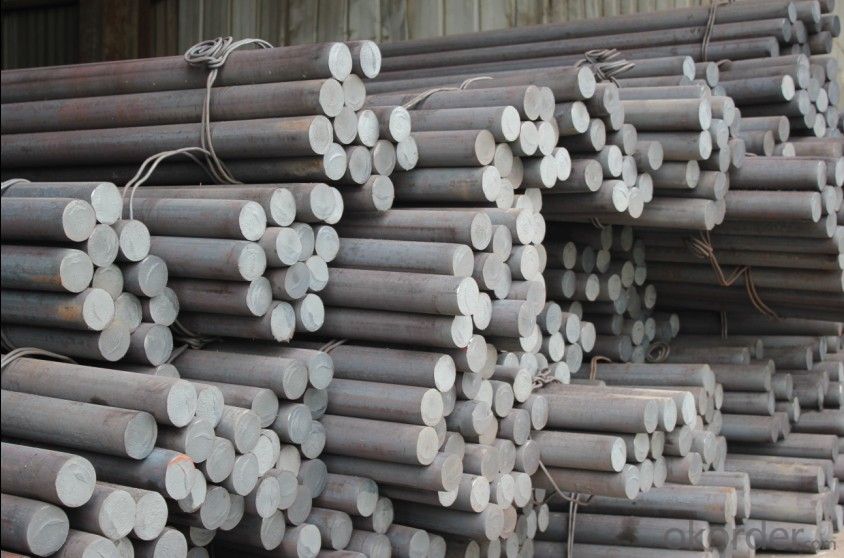
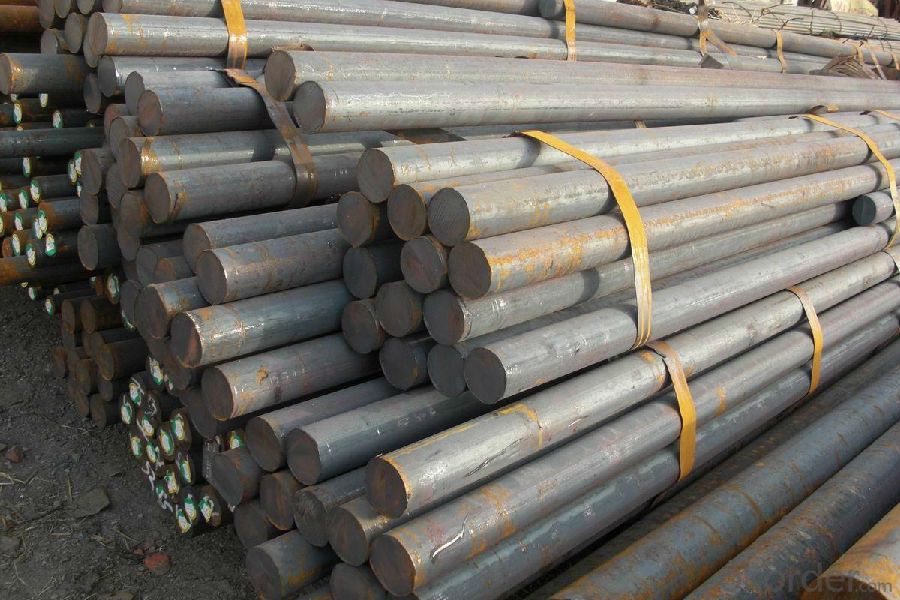
- Q: Can steel round bars be used for making shafts?
- Yes, steel round bars can be used for making shafts. Steel round bars are commonly used for their strength, durability, and machinability, making them suitable for shaft applications in various industries such as automotive, construction, and manufacturing.
- Q: What are the different surface treatments available for tool steel round bars?
- Tool steel round bars can be enhanced in performance, durability, and overall quality through various surface treatments. Some common treatments include: 1. Nitriding: Exposing the tool steel to a nitrogen-rich environment at high temperatures forms a hard surface layer, improving wear resistance and reducing friction. 2. Coating: Coating the tool steel round bars with materials like titanium nitride (TiN), titanium carbonitride (TiCN), or chromium nitride (CrN) provides excellent wear, corrosion, and heat resistance. 3. Black oxide: A chemical treatment that forms a black oxide layer on the surface of the tool steel, improving corrosion resistance and reducing the risk of rusting. 4. Heat treatment: Heat treatment processes like annealing, tempering, or quenching can be applied to tool steel round bars to enhance hardness, strength, and toughness. 5. Surface grinding: By removing a thin layer of material from the tool steel's surface, surface grinding achieves a smooth and polished finish, enhancing aesthetics and reducing surface defects. 6. Shot peening: Propelling small metal or ceramic particles onto the tool steel surface at high velocity induces compressive stress, improving fatigue resistance and extending lifespan. 7. Electropolishing: Immersing the tool steel in an electrolyte bath and applying an electric current, electropolishing removes surface imperfections, enhances surface finish, and improves corrosion resistance. Choosing the appropriate surface treatment depends on the specific requirements and applications of tool steel round bars. Each treatment offers unique benefits, significantly enhancing performance and longevity.
- Q: Can steel round bars be customized or fabricated?
- Yes, steel round bars can be customized or fabricated to meet specific requirements. Steel round bars are commonly used in various industries such as construction, manufacturing, and engineering. They can be customized in terms of diameter, length, surface finish, and even material composition. Customization of steel round bars can be done through various processes. For example, the bars can be cut to the desired length using techniques like sawing or shearing. They can also be bent or shaped using heat and mechanical force to achieve specific angles or curves. Additionally, the surface finish of the bars can be altered through processes like grinding, polishing, or coating. Furthermore, steel round bars can be fabricated to include additional features or components. For instance, holes or slots can be drilled or machined into the bars to accommodate other parts or fasteners. They can also be threaded or grooved to allow for easy assembly or connection with other components. In summary, steel round bars can be customized or fabricated in various ways to suit specific needs. Whether it is altering the dimensions, shape, surface finish, or adding additional features, steel round bars offer flexibility and versatility in meeting different requirements across industries.
- Q: Can steel round bars be used for making springs?
- Yes, steel round bars can be used for making springs. Steel is a widely used material for springs due to its high strength and durability. Steel round bars can be shaped into various types of springs, including compression springs, extension springs, and torsion springs. The round bar can be cut to the desired length and then heat-treated to achieve the desired hardness and springiness. The specific type of steel and the heat treatment process will determine the spring's characteristics, such as its load-bearing capacity, flexibility, and resistance to fatigue. However, it is important to note that the design and engineering of springs require careful consideration of factors such as the required spring rate, maximum load, and operating conditions to ensure the optimal performance of the spring.
- Q: What are the environmental considerations of steel round bars?
- Steel round bars pose several environmental considerations. Firstly, the extraction of iron ore, which is necessary for steel production, can have adverse effects on ecosystems and habitats. The mining process can cause deforestation, soil erosion, and the release of harmful pollutants into the air and water. In addition, manufacturing steel round bars requires a substantial amount of energy, often derived from non-renewable sources like coal and natural gas. The combustion of fossil fuels for energy contributes to greenhouse gas emissions and climate change. The steel industry is a major global emitter of carbon dioxide. Furthermore, the transportation of steel round bars also has environmental consequences. When steel products are shipped over long distances, it contributes to carbon emissions and air pollution. This is particularly significant when steel is imported or exported over vast distances. However, it is crucial to acknowledge that steel is a highly recyclable material. By recycling steel, the need for new production is reduced, energy is conserved, and the environmental impacts related to mining and extraction are decreased. By opting for steel round bars made from recycled steel, individuals and industries can contribute to a more sustainable and environmentally-friendly approach. In summary, the environmental considerations of steel round bars encompass the impacts of mining and extraction, energy consumption during production, and transportation emissions. Nevertheless, the recyclability of steel presents an opportunity to mitigate these environmental impacts and foster a more sustainable steel industry.
- Q: Q235 and mechanical properties of hot rolled steel cold drawn steel have what difference, Q235 hot rolled steel with 12 combined shearing machine has a number of very hard, the damage of the blades, why
- Secondly, have a great relationship with the mechanical properties of heat treatment of steel, quenching hardness increased, annealing hardness decreases, the same kind of material of steel under different heat treatment, the hardness difference is very big, you said the hot bar is excellent, there may have been a quenching in the production process
- Q: Which is hard, round steel or screw steel?
- If the diameter is the same, of course, the rebar is of great hardness.Round steel is a solid strip of steel whose cross section is round. The specifications are expressed in millimeters of diameter, such as "50", which means a round bar of 50 millimeters in diameter.
- Q: Can steel round bars be bent?
- Yes, steel round bars can be bent. The flexibility of steel allows it to be shaped and manipulated into various forms, including bending round bars into desired angles or curves.
- Q: What are the advantages of using chromium-alloy steel round bars?
- Chromium-alloy steel round bars offer numerous benefits. Firstly, they possess exceptional corrosion resistance. The addition of chromium enhances their ability to withstand corrosion and oxidation, making them suitable for use in harsh environments and applications involving moisture or chemicals. This resistance prolongs their lifespan, reducing maintenance and replacement expenses. Secondly, these round bars provide high strength and durability. The alloying of chromium with steel improves their mechanical properties, including tensile strength, hardness, and toughness. As a result, they are ideal for applications requiring strength and resistance to wear and tear, such as construction, heavy machinery, and the automotive industry. Another advantage is their heat resistance. The inclusion of chromium enhances the steel's ability to maintain its strength and structural integrity even at high temperatures. This makes it suitable for use in high-temperature applications like furnace components, boilers, and heat exchangers. Moreover, chromium-alloy steel round bars are known for their excellent machinability. The alloying elements in the steel enhance its ability to be easily machined, enabling precise shaping and finishing. This simplifies and reduces the cost of manufacturing complex components or parts. Lastly, these round bars are readily available in the market. Due to their popularity and widespread use, they can be easily obtained from various suppliers. This availability ensures a consistent supply of the material, minimizing production downtime and lead times. Overall, the advantages of using chromium-alloy steel round bars encompass corrosion resistance, high strength and durability, heat resistance, excellent machinability, and availability. These properties make them a versatile and dependable choice for various industries and applications.
- Q: Are steel round bars suitable for bridge construction applications?
- Yes, steel round bars are suitable for bridge construction applications. Steel is known for its strength, durability, and versatility, making it an ideal material for bridge construction. Steel round bars provide excellent structural support and can withstand heavy loads and harsh environmental conditions. Additionally, steel round bars can be easily fabricated and customized to meet specific bridge design requirements.
Send your message to us
Steel Round Bar with Grade Q195/Q235 and High Quality
- Loading Port:
- China main port
- Payment Terms:
- TT OR LC
- Min Order Qty:
- 100 m.t.
- Supply Capability:
- 2000 m.t./month
OKorder Service Pledge
OKorder Financial Service
Similar products
Hot products
Hot Searches
Related keywords
